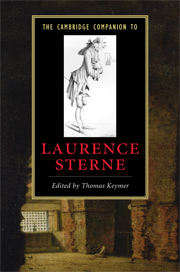Book contents
- Frontmatter
- Introduction
- 1 Laurence Sterne’s life, milieu, and literary career
- 2 Scriblerian satire, A Political Romance, the ‘Rabelaisian Fragment’, and the origins of Tristram Shandy
- 3 Tristram Shandy, learned wit, and Enlightenment knowledge
- 4 Tristram Shandy and eighteenth-century narrative
- 5 The Sermons of Mr. Yorick: the commonplace and the rhetoric of the heart
- 6 A Sentimental Journey and the failure of feeling
- 7 Sterne’s ‘politicks’, Ireland, and evil speaking
- 8 Words, sex, and gender in Sterne’s novels
- 9 Sterne and print culture
- 10 Sterne and visual culture
- 11 Sterne and the Modernist Moment
- 12 Postcolonial Sterne
- Further reading
- Index
- Series List
12 - Postcolonial Sterne
Published online by Cambridge University Press: 28 January 2010
- Frontmatter
- Introduction
- 1 Laurence Sterne’s life, milieu, and literary career
- 2 Scriblerian satire, A Political Romance, the ‘Rabelaisian Fragment’, and the origins of Tristram Shandy
- 3 Tristram Shandy, learned wit, and Enlightenment knowledge
- 4 Tristram Shandy and eighteenth-century narrative
- 5 The Sermons of Mr. Yorick: the commonplace and the rhetoric of the heart
- 6 A Sentimental Journey and the failure of feeling
- 7 Sterne’s ‘politicks’, Ireland, and evil speaking
- 8 Words, sex, and gender in Sterne’s novels
- 9 Sterne and print culture
- 10 Sterne and visual culture
- 11 Sterne and the Modernist Moment
- 12 Postcolonial Sterne
- Further reading
- Index
- Series List
Summary
Sterne occupies a central place in postcolonial studies, a field that traces the evolution of Western colonialist thought as well as its contestation in postcolonial literatures. By likening Toby's fixation upon the wars of William and Anne, through which England laid claim to world power, to Walter's delight in philosophical systemisations through which he hopes to 'govern' other people and the future, Sterne seems to identify political and intellectual sources of Britain's imperialism, and subject them to satirical critique. In later decades, Sternean sentimentalism entered into abolitionist (anti-slavery) discourse by suggesting that affective, divinely-inspired recognitions of ethical bonds reveal all intellectualised justifications of inhumanity to be impositions upon others and ourselves. In our own era, Shandean themes and character types, which underscore how easily, persistently, and inventively human subjectivity may assume forms complicit with imperialistic power relations, become recurrent preoccupations within contemporary postcolonial fiction. / Sterne and abolition / As early as his sermon on 'Job's account of the shortness and troubles of life, considered', published in 1760, Sterne anticipated abolitionist thought. Although this sermon conventionally decries slavery as a postlapsarian evil, and its frame of reference is classical rather than Caribbean (Sermons 10.99), it prompted an ex-slave, Ignatius Sancho, to urge Sterne to 'give half an hours attention to slavery (as it is at this day undergone in the West Indies)'; handled in Sterne's manner, the subject would 'ease the Yoke of many, perhaps occasion a reformation throughout our Islands' (Letters 282-3).
- Type
- Chapter
- Information
- The Cambridge Companion to Laurence Sterne , pp. 174 - 189Publisher: Cambridge University PressPrint publication year: 2009

